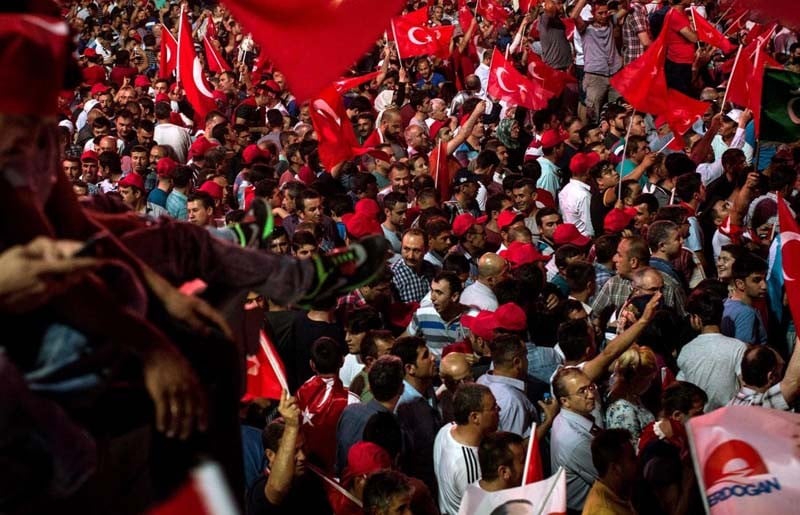
As Turkey successfully foils the coup, Erdogan must desist from taking harsh measures against the plotters and their allies

Only in Turkey and Pakistan are coups never far from the surface even when democratic government with solid mandates are visibly in the saddle. In Turkey, the possibility of a coup was even remoter because of President Recep Tayyip Erdogan’s huge popular mandate and his long occupation of different offices of the state which had severely diminished the ability of the military. Yet the Turkish military staged an unthinkable coup in an effort to deliver a dying kick of its old habit.
However, unlike the past, the coup faced stiff popular opposition which stopped the coup in its track and led to wide-scale arrest of coup-plotters. On surface, Turkey has come of age in terms of democratic maturity and the possibility of future coups has been nipped in the bud. Although the possibility of the coup was not on the cards after Erdogan’s effective defenestration of the military in recent years, the attempted coup on July 15 took everyone by surprise.
The mini coup came from nowhere. It was initiated by a section of the military with no broad-based support within the military. The arrest of the chief of the staff was the first early sign that the military high command was not on board. It was also not clear who was the leader of the coup. From the way the coup panned out, it became quite clear that it was a lower order coup involving a large chunk of major and colonel-level officers with a sprinkling of brigadiers, generals and admirals as was the case of coup against the democratically-elected president Alfonsin in Argentina in 1984.
More crucially, the coup lacked support from the Turkish land forces which constitute 65 percent of the Turkish armed forces.
Coups at this level of professional participation have a rare chance of succeeding unless they are popular with the wider public. The fact that Turkey is a fast maturing democracy, the popular support for the coup was not in offing as the subsequent events showed. The coup began with the coup-plotters assuming control of key bridges, tv stations and parliament. It seems the limited base of the coup, both in military and outside, did not give depth to the coup which requires simultaneous movement and control all over the country with all key urban centres, key installations occupied and the key politicians rounded up. In the case of the Turkish failed coup nothing of the sort happened.
The control of the coup plotters over tv station was patchy and was resisted at some tv stations. As a result of this, President Erdogan was able to immediately contact his supporters and the country at large through his mobile phone which was shown live on the Turkish CNN. The moment Erdogan boldly called his supporters and all democracy loving Turks to flood the square and airports to counter the attempted coup the fate of the rag-tag coup was sealed.
The eruption of popular resistance led to hand-to-hand clashes and weakening of the coup-plotters’ hold on bridges and airports. In a repeat of the Chilean style military coup, the coup plotters also reportedly tried to kill President Erdogan. The president quick escape from his holiday destination, on tip off from a loyal military general, and his quick dash to Istanbul to direct the popular response to the coup was the defining moment.
Within two days, the government was able to establish its writ by rounding up thousands of the coup-plotters and judicial functionaries believed to be coup-friendly.
The botched coup constitutes a watershed in the recent history of Turkey. Its effects are going to be felt far into the future.
One, the coup has put an end to the idea of future coups. With this failed coup, the future coup will become an abnormality as demonstrated by popular mobilisation against the coup. This has entrenched the principle that those elected by people can only be thrown out and protected by people. Furthermore, widespread arrest of the coup leaders will send out a strong message against any such adventurism in future
Two, on the external front the coup has sharpened tensions between the US and Turkish president Erdogan. Erdogan has openly accused the US of harbouring Fethullah Gulen, a preacher, believed to be an inspiration behind the coup. If the US delays extradition of the preacher, this may embitter relations further.
Three, the aftermath of the coup has also serious implications for rule of law and freedom of speech. The widespread crackdown on the coup-plotters and their allies has raised serious question about the rule of law and freedom of speech issue. While there is a strong case to punish the coup-plotters and their allies, the rule of law must be adhered to during this process. Those found responsible for this unconstitutional and treasonous act should be punished after due process.
The idea of bringing back death penalty may cost President Erdogan the goodwill of EU and other countries that has come his way after the military coup. The president will be well-advised to play his hand cautiously in the aftermath of the coup to build upon the long-term gains generated in sympathy for the Turkish democratic order worldwide.